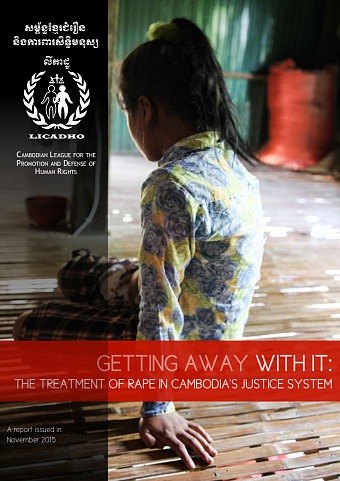Getting Away With It: The Treatment of Rape in Cambodia's Justice System
Published on 29 November 2015Today, to mark the global campaign 16 Days of Activism against Gender-Based Violence, which began on November 25 and runs until December 10, LICADHO is publishing a new report Getting Away With It: The Treatment of Rape in Cambodia’s Justice System. The report presents evidence of the immense failure of the Cambodian justice system to properly investigate and prosecute cases of rape involving women and children. It provides details of multiple systemic flaws – corruption, discriminatory attitudes towards women and girls, misinterpretation of the law, and lack of resources – which, together, mean that many perpetrators of rape receive only very lenient punishment or go completely unpunished.
“The trauma and suffering experienced by rape victims is so extreme, said Nap Somaly, Senior Women’s and Children’s Rights Monitor. “It’s really time that those at the very highest levels of government made the problem of sexual violence against women and children a priority issue.”
The report is based on a review of 762 cases of rape and attempted rape investigated by LICADHO in 2012, 2013 and 2014. The cases took place in Phnom Penh and the 12 provinces in which LICADHO had offices during that period. 225 cases involved women of 18 or over, and 537 cases involved children under 18. Of the victims under 18, 58 (10%) were under 6, 181 (32%) were 6-11 and 328 (58%) were aged 12-17.
Of the 762 cases, 424 were closed by the time of writing the report. Whilst around a third of the closed cases ended with a conviction and sentence that was compliant with criminal law, another third ended before trial and the final third ended with a conviction that was in some way flawed, or with an acquittal.
Every time the victim comes into contact with a public official, it’s likely that they will have to make a corrupt payment and if the suspect has money he will probably be able to buy his freedom.
More than half of the cases which ended before trial were settled by the payment of compensation to the victim by the suspect, in return for which the victim dropped the criminal complaint. Others ended with marriage between the victim and the suspect or with the victim simply dropping the complaint because of a variety of factors including poverty and disability. The cases which closed with a flawed conviction were also varied: many ended with convictions for indecent assault despite an initial charge by the prosecutor of rape; others ended with a conviction for rape but were followed by a sentence that was less than that prescribed by the Criminal Code or by a wholly or partially suspended sentence.
The report finds that whilst the closed cases were flawed in many different ways, there was a common theme which united them: corruption. In almost every type of case, from those which ended with compensation negotiated at the police station to those that went all the way to trial, corruption was a feature.
“Corruption is everywhere,” said LICADHO Director, Naly Pilorge. “Every time the victim comes into contact with a public official, it’s likely that they will have to make a corrupt payment and if the suspect has money he will probably be able to buy his freedom. Sometimes it seems like the authorities don’t care about justice. Instead, rape cases are just a way for them to make money.”
The report concludes that the failure to punish perpetrators of rape reinforces existing public mistrust of the Cambodian justice system and conveys the message that rape is not an offence that will be treated seriously; it not only lets down the victims concerned but reduces the likelihood that future victims will take the risk of reporting the crimes committed against them. The report calls on the government to lead the response to this issue and provides a set of recommendations to the Cambodian authorities on how to address the multiple inadequacies in law enforcement raised by the report.
As well as releasing the report, on November 30 at 9 am, LICADHO will be broadcasting a live show on WMC radio 102 MHz featuring a discussion with LICADHO’s Senior Women’s and Children’s Rights Monitor and the father of a rape victim. The programme will be repeated throughout the 16 day campaign. At 7.30 pm on December 1 RFA will hold a roundtable discussion on the issues raised by the report featuring LICADHO President Dr Pung Chhiv Kek.
For more information, please contact:
▪ Ms. Nap Somaly, LICADHO Senior Women’s and Children’s Rights Monitor, 012 251 118
▪ Ms. Naly Pilorge, LICADHO Director, 012 803 650
PDF: Download full statement in English - Download full statement in Khmer
MP3: Listen to audio version in Khmer
- Related
- Topics
- Children's Rights Judiciary/Rule of Law Women's Rights








